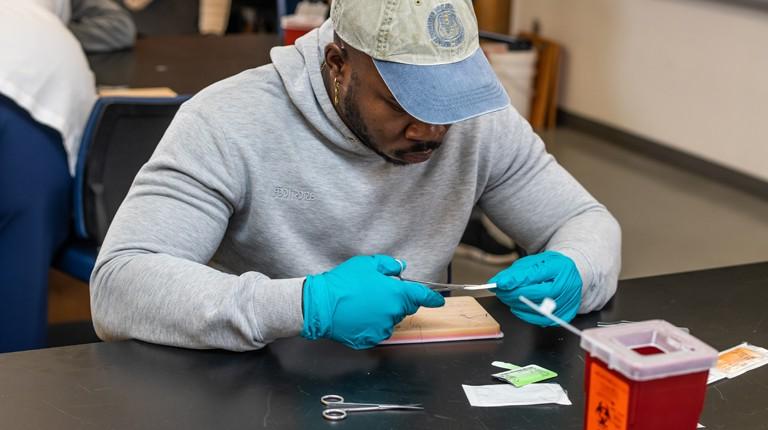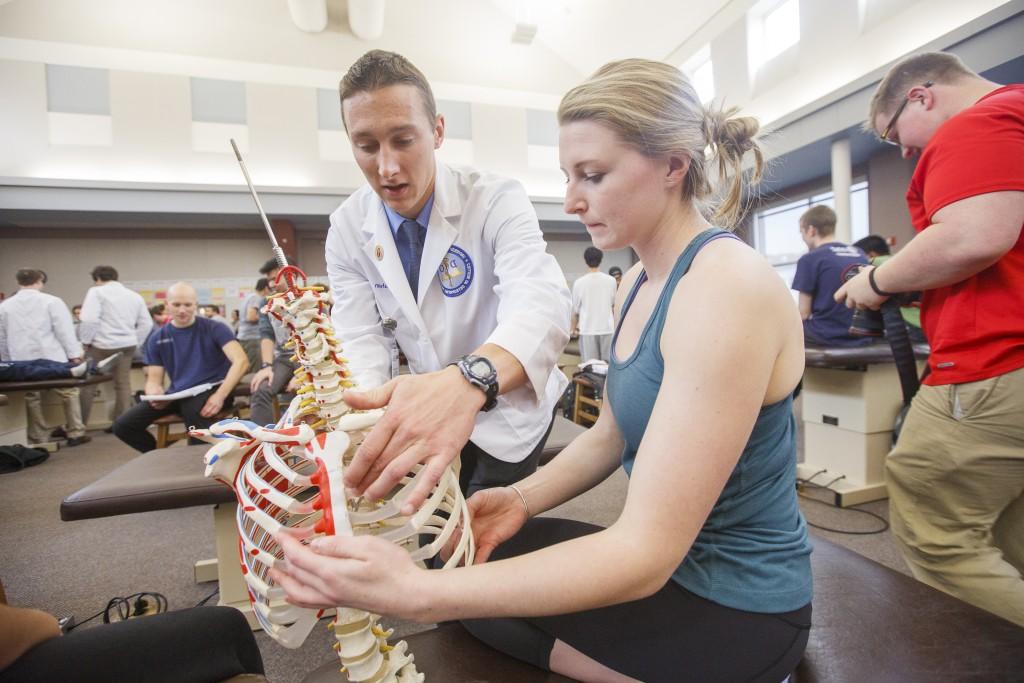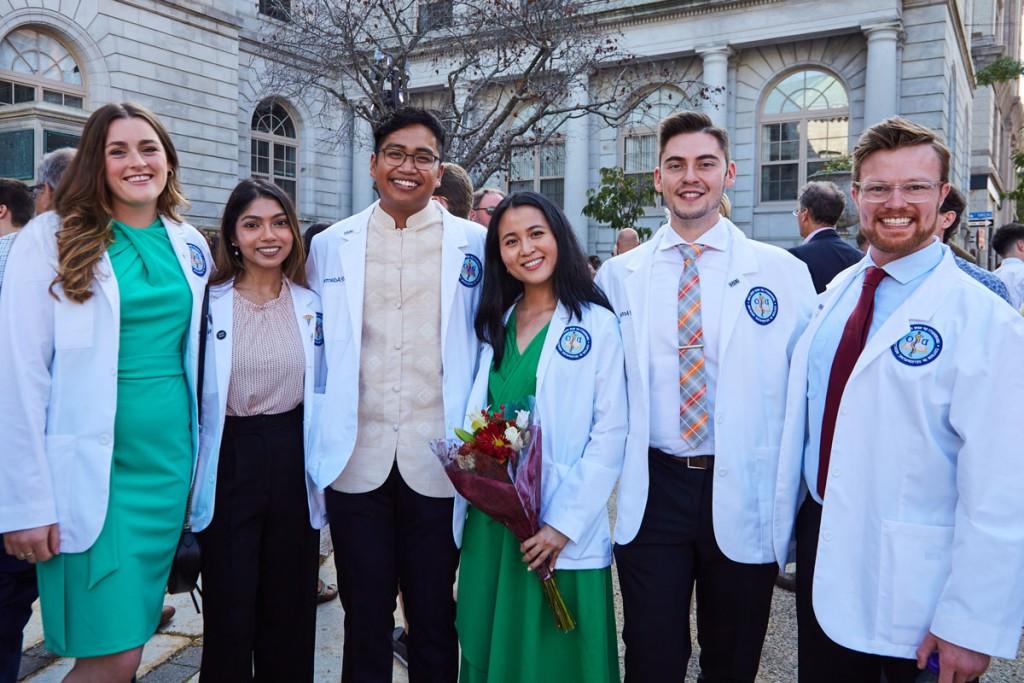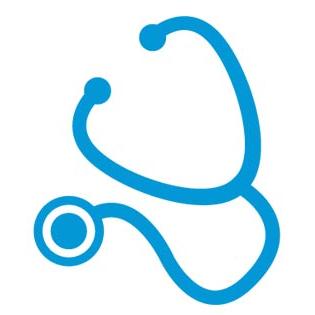Earn Your D.O. at Maine’s Only Medical School
For more than 40 years, the University of New England College of Osteopathic Medicine (UNE COM) has created compassionate, community-minded physicians. Students in our Osteopathic Medicine degree focus on whole-body health and learn to thrive in team environments to create the best possible patient outcomes.
UNE COM is Maine’s number one provider of physicians. Nationally recognized for leadership in primary care, rural medicine, osteopathic medicine, and geriatric healthcare, we are ranked among the country’s top medical schools.

Percentage of UNE COM D.O. ’23 students that matched with their first choice residency program
Why UNE for your D.O.
Graduates of the UNE College of Osteopathic Medicine are prepared for successful health careers. UNE is one of the top ten medical schools in the U.S. for graduates being matched with their first-choice residency, and we rank in the top 10 for average score on the COMPLEX-USA exam.
A UNE COM education happens within a supportive culture, in state-of-the-art facilities on beautiful Maine campuses. Students experience an innovative curriculum at our high-fidelity simulation lab and learning laboratories for clinical skills, anatomy, and osteopathic manipulative medicine. Courses incorporate interprofessional education and are led by expert faculty who use small-group, team-based, and peer teaching.
What will you study? Osteopathic Medicine Curriculum Overview
About Osteopathic Medicine and the Profession
Osteopathic Medicine is a distinctly American branch of medicine that pioneered the concepts of wellness and the whole-person approach to health when it was developed in the late 1800s. Currently, 10% of physicians in the United States are graduates of osteopathic medical schools and bring a philosophy that considers the mind-body-spirit connection to the evidence-based care of their patients. Through the lens of wellness, doctors of osteopathic medicine (D.O.s) help patients with a full range of medical treatment options, including surgery, pharmaceuticals, and manual medicine. As a physician or surgeon practicing osteopathic medicine, you bring a unique patient-centered approach to the full spectrum of health care.
Becoming a D.O. requires four years of medical school after obtaining a bachelor’s degree. The first two years — pre-clerkship years — focus on building a foundation of biomedical and medical knowledge and skills. During the second two years — clerkship years — you apply and expand your knowledge and skills in clinical settings. The course of studies leading to the D.O. degree must be completed within 6 years of matriculation (or within 150% of the standard time to obtain the degree).
Learn more about osteopathic medicine
Pre-Clerkship and Clerkship
The pre-clerkship curriculum occurs on campus where the fundamental knowledge of anatomy, manual medicine, clinical skills, and medical sciences are taught primarily in small group, team-based, and simulation settings.
Clerkship training takes place at one of our clinical campuses throughout the Northeast. Students spend time on various specialty services at clinics and hospitals, gaining firsthand experience providing medical care in different settings. During your fourth-year, you participate in the Match or one of the other post-graduate training assignment programs, which — depending on your specialty — take an additional three to seven years to complete.
An Alternative Approach to Clinical Rotations
UNE COM is one of fewer than 30% of medical schools to offer a Longitudinal Integrated Clerkship (LIC) — an alternative way of organizing the third-year clinical experience that is modeled after residency programs. Rather than rotating through six-week blocks focusing on a single discipline, you will be embedded within a primary care clinic where you will follow your own patients for the year while experiencing specialty-focused time on the days when you are not assigned to a clinic. The LIC applies the residency training model to third-year clerkships. Students who participate in LICs:
- Earn equal or greater clinical skills and exam scores
- Build professional relationships with colleagues and patients
- Are placed at one of six host sites in Maine
A Care for the Underserved Scholars Program for Additional Skill Building
This two-year honors distinction program enables students to participate in clinical and non-clinical activities in a variety of rural and urban underserved settings. You will:
- Improve leadership skills
- Gain competencies in interprofessional education and team-based practice
- Understand and address health disparities and the social determinants of health in rural and underserved communities
- Understand the role of practice transformation in addressing significant health and public health issues





Doctor of Osteopathic Medicine Facilities
Harold Alfond Center for Health Sciences
The Alfond Center for Health Sciences is a three-story building housing numerous labs and lecture halls, including the donor anatomy lab — the only lab of its kind in southern Maine. The building also houses the Osteopathic Medicine Skills Laboratory, an open lab with 60 patient tables where you practice manipulative medicine and physical examination techniques.
Leonard Hall
Leonard Hall is one of the largest interactive classrooms of its kind in the country. The 4,900-square-foot room features movie-size video screens, ceiling-mounted projectors, cameras for video capturing, and wired-in group study tables.
Pickus Center for Biomedical Research
The Pickus Center for Biomedical Research is a state-of-the-art biomedical research building that houses research teams of UNE faculty and students. The 22,000 sq. ft. structure includes six laboratories, enabling you to engage in important research as part of your curriculum.
Portland Laboratory for Biotechnology and Health Sciences
The Portland Laboratory for Biotechnology and Health Sciences encompasses a 5,000-square-foot research space on the third floor and basement level of the UNE Pharmacy building on the Portland campus. The laboratory is equipped with instrumentation to support and enable research conducted by UNE faculty and students from across the University as well as external partner institutions.
This modern research space provides infrastructure for ongoing research in therapeutic discovery, biosensor development for biomanufacturing, translational pharmacology, biomarker development and drug metabolism/pharmacokinetic research. In addition to providing infrastructure for state-of-the-art research, a major focus of this laboratory is to provide workforce development opportunities for students with interest in careers in biotechnology and health sciences.
Interprofessional Simulation and Innovation Center
As a D.O. student, you utilize our Interprofessional Simulation and Innovation Center to apply the knowledge that you gain in the classroom to realistic clinical situations before putting actual patients at risk.
Guided by skilled instructors, you participate in simulations specifically designed to enhance your clinical aptitudes. Rather than just hearing and reading about difficult or unusual cases, you experience them by treating high-fidelity patient simulators and patient actors in scenarios that mimic real life.
Stella Maris Hall
Stella Maris Hall houses 12,000 sq. ft. of laboratory and office space, including the Office of the Deans. Neuroscience faculty share core facilities dedicated to behavioral phenotyping, electrophysiology, histology, and molecular biology. The building also contains an animal vivarium, BSL-2 level laboratories, and other labs that support a multidisciplinary approach to understanding brain function and diseases of the nervous system.
Osteopathic Medicine: Team Based Learning
Home to Maine’s only dental school and a full range of other health professions programs, UNE offers you the opportunity to learn from and interact with students and faculty from across health care disciplines. It’s a concept known as interprofessional education (IPE), and UNE is a national leader in this approach. With team-based care now the gold standard, our expertise in providing collaborative learning experiences gives our medical students a significant edge in the workforce and, more importantly, better patient outcomes.
In addition to the interprofessional experiences you’ll gain through curriculum and clinical rotations, you may pursue other IPE opportunities offered by three of our University partners: The Center for Excellence in Aging and Health (CEAH), the Center to Advance Interprofessional Education, and the Center for Excellence in Public Health. You’ll have the unique opportunity to use such experiences toward your Interprofessional Honors Distinction.

Research in the Doctor of Osteopathic Medicine program
We recognize and support the role of research in all of our educational, clinical, and basic science activities. Research is fundamental to excellence in teaching and the creation of a scholarly atmosphere for learning.
With eight centers of research and scholarship, UNE is designated as a “doctoral university with high research activity” by the Carnegie Classification of Institutions of Higher Education. Six of these centers are health-related, and you’ll have the opportunity to collaborate with faculty in a wide array of research, including projects related to metabolic disease, immunology, neuroscience, pain management, aging, and more. You may also apply for funding to conduct original research through one of our student research fellowships. Additionally, the Northern Light Rural Scholars program spans years 1–3 and combines research experience with clinical training in a rural Maine setting.
Post-Doc Education
UNE’s commitment to the continuation of medical education extends beyond graduation. Both on campus and at affiliates throughout the Northeast and into the Mid-Atlantic, UNE COM partners with or sponsors residency programs that highlight our passion for osteopathic medicine and our dedication to training osteopathic physicians who serve the world. Learn more about Continuing Medical Education at UNE
Living and Learning in Maine
As a student in one of our College of Osteopathic Medicine programs, you study on UNE's coastal Biddeford and historic Portland campuses. In Biddeford, the waters of the Saco River flow into the Atlantic Ocean. Recently named the youngest city in Maine, Biddeford boasts an up-and-coming, hip downtown offering delicious eateries, exciting social and cultural events, and more.
Our Portland Campus for the Health Sciences is located in a quiet neighborhood that is a 10-minute drive from the downtown waterfront. The campus is close to major clinical sites as well as countless attractions and amenities. Named “America’s Most Livable City” by Forbes and “Foodiest Small Town in America” by Bon Appetit, Portland is the city on every list.
Take a Virtual Tour of Our Biddeford Campus
Take a Virtual Tour of Our Portland Campus
Who can apply to the doctor of osteopathic medicine degree program?
To apply to our D.O. degree program, you must have completed 90 semester hours or 75% credit progress towards a bachelor’s degree, to be earned at a U.S. regionally accredited college or university, or international equivalent. You must also hold a 2.8 cumulative GPA.
Financial Aid at UNE
Finance your education through loans, grants, and scholarships. We are committed to making our osteopathic medicine degree program as affordable as possible.
Apply Today
Ready to begin your future in UNE’s D.O. program?







